Erstellt am: 19. 1. 2012 - 21:25 Uhr
Sacrifice, Steroids, & Stress

Johnny Bliss, 2012
* - from hosting the Games in 1964 and 1976.
When I arrived in Innsbruck half a week ago, I was pleasantly surprised to find that the ecological footprint of the Winter Youth Olympic Games was significantly lower than usual at such a mega-event, partially thanks to the city's already-existent Olympic infrastructure*, and partially due to the significantly smaller scale of the Youth Games themselves.
The budget, while overrun, is still significantly smaller than at almost any IOC or FIFA-related event ever; free speech has not been publicly blocked; there are no protest camps built up; and I have heard nothing about poor and homeless people getting rounded up and taken away. Security people with guns have not, to my knowledge, turned up in inappropriate places in town. In short, I could relax, interview athletes, and go to sporting events for purely entertainment purposes.
At that point is where I ended my last web story.
And then I went to the Women's Figure Skating Finals, two nights ago.
Jump, spin, spiral, and occasionally fall
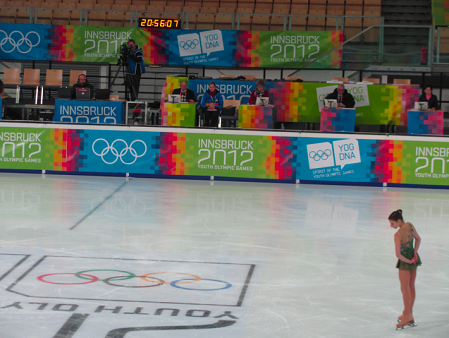
Johnny Bliss, 2012
At first, it was really quite what you would expect, given the age range of the athletes involved. As I came in, the Finals were just starting, and I watched three European figure skaters decently jump, spin, spiral, and occasionally fall on the ice (and then get all self-conscious about it).
But I mean, what they were doing was certainly impressive. I certainly couldn't have done any of it, even without ice skates on.
Each of the athletes had their own soundtrack - usually something terrible, off of a bad movie soundtrack, but occasionally there was a good song, either a classical symphony or at least something not terribly obvious.
But anyway, there were three groups of six figure skaters. The order felt strangely staged: the skaters seemed to improve as the night went on, each one better than the last, almost as if the results of the competition were already pre-determined. I'm not, mind you, suggesting that they were pre-determined, merely that whoever decided the group order, already had some idea of each athlete's level, and made the timetable accordingly.
There came a point where each of the figure skaters was pulling amazing and impressive moves -I particularly liked the style of the Australian and Swiss skaters- and I was utterly convinced that we had already seen the Gold and Silver medalists on the ice... and that's when the Asian and Russian skaters started to appear.
A stunning, flawless execution of perfect form.
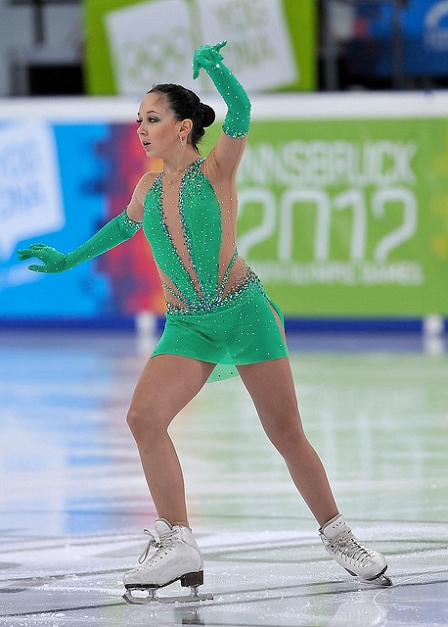
Innsbruck 2012
I pluralize "Russian", because they were the sole country to have two skaters entered into the competition. They also had the biggest turn out, the most fans decked out in the home colours. They really cared. So did the Asian teams, especially the Chinese, but, well, it was on a different level. You started to see something different in the Asian and particularly Russian athletes, where they didn't appear to be nervous or uncertain at all, they just got on the ice, did their thing technically perfect but not especially passionate, bowed at the end of the song, and exited left.
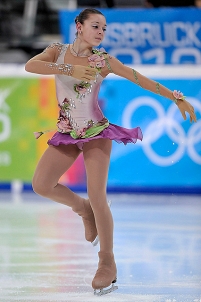
Innsbruck 2012
* - I should add, I didn't manage to catch at the time which athlete this was, and spent a big part of the last two days finding out; only twenty minutes ago did I manage to obtain this information. As they say in Canada, "Don't forget to forget to fact check!"
At some stage, as I was sitting there, lost somewhere in my own world, I distinctly heard one of the hosts state that one of the competitors had been in the habit of training for as long as 48 hours a week, which sounds ridiculous and improbable, more like teenage bravado, until you put in mind that the figure skater in question was from Korea- and pressure to succeed is much higher over there.*
In the end, Russia came in first. And second place. Their performance was a stunning, flawless execution of perfect form. There was nothing to be said against it, and yet both were completely joyless performances. I watched the show, and I was impressed, but I'd have to say it was too technical and choreographed for my tastes.
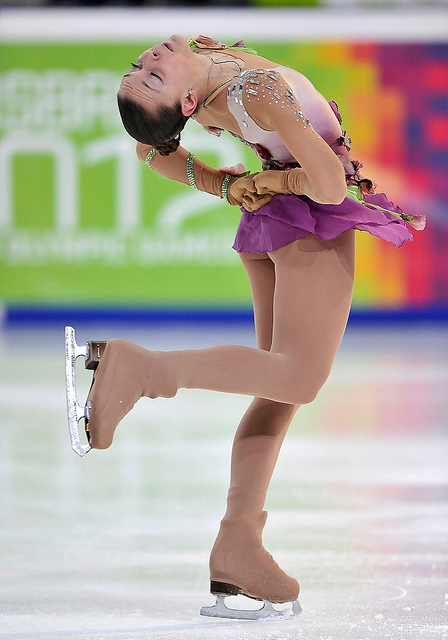
Innsbruck 2012
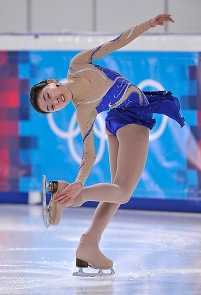
Innsbruck 2012
Third, Fourth, and Sixth place were taken by China, Korea, and Japan, in that order. Fifth was actually France.
--
The next day, I had arranged to meet with Gebi Mair, the region of Tyrol's Green Party representative in Parliament. I had heard that he was somewhat dubious of the benefits, critical of the impact of the Youth Olympic Games, and I'd wanted to hear a different side of the story than the kind I would get from athletes, spectators, and the IOC-volunteers and coordinators you would find in the official venues.
I was prepared to hear the usual criticisms of mega-events that I'd heard in Cape Town and Vancouver in 2010*, and to be fair, he did tell me quite a bit about how the budget overruns would affect the taxpayer, but then he came out with an entirely different - and timely - human concern.

Johnny Bliss, 2012
[There is another] problem which even the International Olympic Committee is talking about, he told me earnestly in his office that afternoon. At the very beginning, when Jacques Rogges was proposing the Youth Olympic Games, he said (to summarize): 'One of the main problems could be that there are young athletes, who might get into pressure, publicity, [and] some of the other negative effects.'
So even he was talking about doping already, when he was proposing the Olympic Games. He said, 'this might be too young an age for young athletes.' We're not talking only about young athletes here in Austria, we're also talking about young athletes in China, and what happens, if you [lower] the age level of these competitions. In sports like ice figure skating, there were [many] discussions about how young athletes really should be. Of course, 14 year olds can do [high skill-level] sports, that's not the point. But the question is, is it good for their development?
In our heads, there might be this image that these are students, having fun and [enjoying] sports. But that is not the point [for] young guys in [certain] other societies. I mean, we have to be honest about this. This is, in some cases, young girls and boys, full of steroids. We're talking about societies which want immensely attractive results, even by twelve year old children, and you [risk taking away] part of their childhood.
As much as I would like to dismiss this notion, I had to admit it resonated with me, in the context of what I had seen and felt so far.
This story is not finished. Over the next few days I will be interviewing some young athletes who have competed over the last few days, to see if I can find out anything less hypothetical on the ground. I will be publishing some of the Results (pun intended) in my next Olympia web story.


